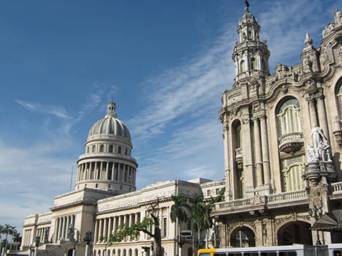According to the Larousse dictionary, the Spanish verb extrañar means the following: to be surprised, to find something odd because it is new, to miss someone or something, to be delighted…
Cubans in Cuba miss air-conditioned movie theaters and their weekly premieres that came to us “just released” from all over the world, including those from “across the street.*” We miss the cafes with their popular café con leche — so typical of Havana — accompanied by toast slathered in butter.
We miss the bars and bodegas where for a modest price you could get a nice sandwich or a delicious bisuit. Or a coffee for three centavos, which you could buy at almost at every bus stop. Or the equally cheap and delicious frita cubana, made with beef and ground pork, served on soft, round bread and accompanied by onion rings and julienned potatoes. Or the freshly-made hot little tamales (spicy or mild). Or the fruit smoothies called batidos from Chinese-owned stalls such as Navidad along the Malecon, where you would go to cool off on summer nights or to “chase the waves” as they entered from the north. Or walking up and down the Rampa chatting with friends.
But what we miss most of all is Sunday’s delicious arroz con pollo — chicken with rice — garnished with pimentos and olives, and shared with family. And the crushed ice covered in fruit juice sold at kiosks throughout the city. And the stalls selling oysters with lemon, which you would eat right there. And the buñuelos (or donuts) with “cane syrup” you would have at your grandmother’s house. And those neighborhood clubs which gave parties for children and adults. Or those places along the beach, where you could dance every evening starting at six, almost always accompanied by an orchestra or live band. In other words all the many, many options that began disappearing after the abrupt political changes of 1959.
But what does a Cuban who was forced to emigrate sometime in the last five decades miss? As far as I have been able to ascertain, he misses the Malecon, the Rampa, family meals, the taste of guava and mango (they say it is not the same as here), the neighborhood, the whistles used to call friends without having to ring their doorbells and other things that, although replaceable outside Cuba, do not have the same “flavor,” no matter how good they might be.
I would like to point out that feelings of nostalgia and longing are not limited to the Cuban diaspora. A frustrated yearning for the “good old days” affects us all of us who, for one reason or another, have decided to remain on this captive island.
With our national heart spit in two, Cubans constantly shuttle back and forth, looking for the “crazy glue” that will once and for all allow us to put back together the pieces of — as Alejandro Sanz calls it — our “shattered heart.” Today it is up to all of us to join forces to continue the struggle until we achieve it.
*Translator’s note: A reference to the United States.
19 June 2014

